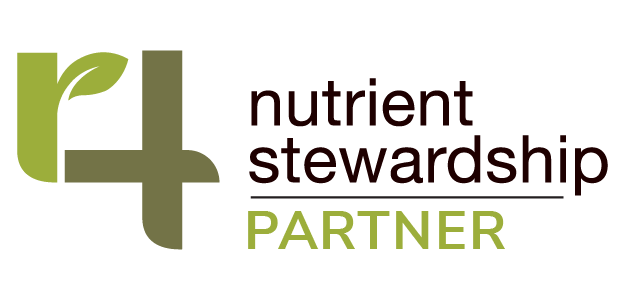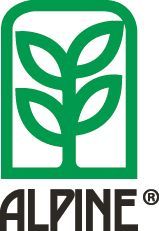and/or low availability fertilizer at times when the plant cannot adequately utilize it. Excessive tillage leads to lower organic carbon levels due to oxidation, fragmented soil structure, and reduced biological activity, which all leads to less water holding capacity. This leads to environmental concerns, more governmental regulations, and is simply not being a good steward of the available resources we have at our disposal. With the outlook of having to do/feed more with less, what solutions can ALPINE offer? The technology found in our Bio-K.

Increasing crop yield to feed the world, responsibly!
Since 1973, ALPINE has built its business and reputation on the belief that by creating superior products that provide nutrients to plants when and where they can be utilized most efficiently makes us all better stewards of the environment. ALPINE employees promote the 4R concept to producers and industry personnel at shows, meetings and conferences across the country.
ALPINE believes in the 4R nutrient stewardship program as it is aligned with our core sales philosophy outlined in our Maximizing Fertilizer Efficiency Handbook. ALPINE focuses on the use of soil and tissue samples to provide growers with fertility recommendations that maximize their return on investment. This enables ALPINE fertility professionals to design a program utilizing several different products to maximize the efficiency and effectiveness of nutrients applied. The product development team focuses on product innovations which meet the goals of the 4R program.
The ALPINE Maximizing Fertilizer Efficiency program involves all of the ALPINE nutrition products. The program’s goal is optimization of fertilizer costs to increase profitability of all crop grown by following the 4R principles. Fertility experts choose the correct product to ensure the crop has the proper nutrition at each of its growth stages while allowing growers to be flexible in applying nutrients as the growing conditions vary during the season.
ALPINE also supplies application kits for starter fertilizers and liquid storage tanks from 50 to 10,000 gallons. ALPINE has centrally located manufacturing facilities in New Hamburg, ON and Belle Plaine, SK to supply the marketplace. ALPINE brand products are part of Nachurs Alpine Solutions, the liquid fertilizer market leader in North America since 1946.
ALPINE provides the highest quality true solution fertilizers that allow for precision application, both in-furrow and foliar to maximize uptake and efficiency. ALPINE helps to maximize the profit potential for our customers while creating a positive impact on the environment by growing higher yielding crops and improving the soil by using the 4R principles.
ALPINE liquid fertilizers are complementary to the 4Rs of Nutrient Stewardship as it encourages using the
right fertilizer source, at the right rate, at the right time, and in the right place.
The right time
The right place
Nutrients on target
The right source
The right rate
The weight of future generations is on their shoulders to provide food for a growing population, but at the same time, doing it in a responsible or sustainable manner. How do we do that? Can it be done? The answer is YES we can.
Tommy Roach
Director, ALPINE Product Development
and Specialty Products
Agriculture is a large word in terms of its meaning to the person reading it. For those in urban areas not directly tied to agriculture, it means having food availability at the local market or grocery store to feed their family. For those involved in the agriculture services sector, it means taking products grown on the farm/ranch, transforming them through manufacturing and processing for eventual distribution at the local store or market. For the farmer and rancher, it means growing crops and livestock to support not only their family, but for people all over the world regardless where you live or what your job description is. The weight of future generations is on their shoulders to provide food for a growing population, but at the same time, doing it in a responsible or sustainable manner. How do we do that? Can it be done? The answer is YES we can.
Speaking specifically to plant fertility, they require balanced nutrition just as humans do. Plant growth and development (which ultimately relates to yield) relies on hormone cycles, enzyme activation, and complex physiological processes. Planting a corn seed in a field or a tomato plant in a pot on a patio will not grow properly without adequate nutrition. Farmers and ranchers of today are expected to feed the world in an environment of shrinking cultivatable land mass and changing global climate conditions. At some point in time, the resources needed to do this will become more limited. They are expected to do more with less. This is where responsible choices enter the picture in order to protect the environment, both now and in the future.
International Plant Nutrient Institute (IPNI) started an initiative years ago to promote good nutrient management practices regardless if in Africa, Brazil, Thailand, or Texas. This is known as the 4Rs of Nutrient Stewardship, which promotes the Right Source, at the Right Time, in the Right Place and at the Right Rate. ALPINE as a company was founded on these very principles in 1946 to provide quality liquid fertility solutions for use at planting, at low rates when the young growing plant needs immediate access to available food. Gone should be the days of over application of irrigation water




